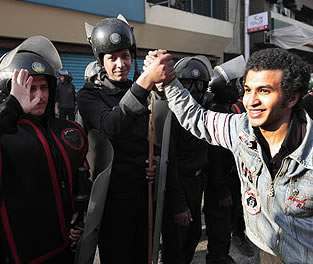Egypt Erupts: Ayatollah Khomeini’s Sermons Are Now On Twitter
 WHAT next for Egypt? With President Hosni Mubarak ousted, the people would be free to be heard and live without fear.
WHAT next for Egypt? With President Hosni Mubarak ousted, the people would be free to be heard and live without fear.
From Cairo, the BBC’s Yolande Knell writes:
Ordinary Egyptians appear to be losing their fear of direct confrontation with the security forces. There have been bloody and drawn out clashes all over Cairo and in some of Egypt’s main cities.
Or:
“In my opinion, the Islamic Republic of Iran should see these events without exception in a positive light,” said Mohammad-Javad Larijani, secretary general of the Iranian High Council for Human Rights and one of the most outspoken figures among Iran’s traditional conservatives.
He made it clear that he hoped that the “anti-Islamic” government of Zine el-Abidine Ben Ali, who was ousted in Tunisia, would be replaced by a “people’s government,” meaning one in which conservative Islamic forces would gain the upper hand, as they did when Iranian people overthrew Shah Mohammed Reza Pahlavi, establishing a quasi-theocracy.
It’s Iran all over again. Writes Stephen Walt of the moves:
[C]onsider what we’re seeing in the Middle East. Whatever the ultimate outcome of events in the Arab world, the speed with which large numbers of people have responded to events far away is remarkable. Just as audiocassettes of the Ayatollah Khomeini’s sermons served as a medium of transmission in Iran’s Islamic revolution in 1979, here a combination of modern mass media (Al Jazeera, the Internet, email, Twitter, etc.) has clearly played a major role in driving the pace of events.
Hugh Hewitt also sees Iran:
“Right now the late ‘70s are back in reruns with Egypt playing the role of Iran. At a minimum, increase the security at the U.S. Embassy.”
The Iranians do not do irony:
Iranian Foreign Ministry Spokesman Ramin Mehmanparast has called on political leaders in Egypt to follow the “rightful demands” of their people.
Posted: 29th, January 2011 | In: Reviews Comment | TrackBack | Permalink



